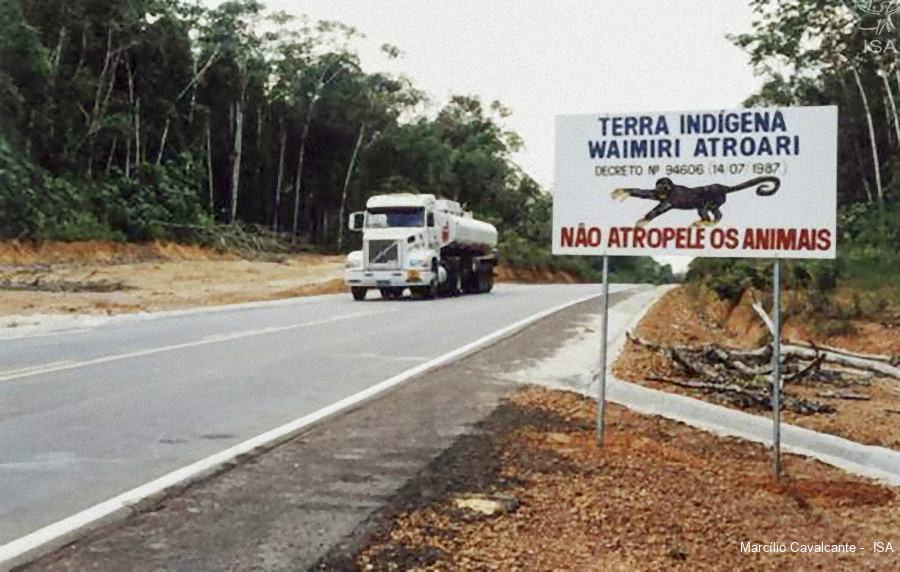Eletrobras privatization bill bypasses FUNAI and IBAMA protection agencies for power line construction
The bill includes a rider that permits work to begin on a transmission line that crosses the Waimiri-Atroari Indigenous Lands without environmental licensing from the specialized agencies and without broad consultation with the indigenous peoples
 Foto: Marcílio Cavalcante/ISA
Foto: Marcílio Cavalcante/ISA
The National Congress approved on Monday, June 21, a bill allowing the privatization of the state-owned energy company Eletrobras. The bill, which still needs to be signed into law by the president, includes a provision, added to secure the votes of lawmakers, that authorizes the construction of the power line between the cities of Manaus and Boa Vista, known as the Tucuruí transmission line, without the need for environmental licensing from FUNAI (National Indian Foundation) or IBAMA (Brazilian Environment and Renewable Resources Institute). The rider also undermines the dialogue in progress between Waimiri-Atroari leaders and government agencies on the energy project.
Of the 721 km of the transmission line’s planned length, 125 km cross the Indigenous Land located on the border between the state of Roraima and Amazonas, where approximately 2,100 people live in 56 villages, according to data from ISA (Socioenvironmental Institute).
The approved rider states that “upon the conclusion of the Basic Environmental Plan-Indigenous Component, translated into the native language and presented to the indigenous people, the federal government is authorized to start work on the Tucuruí Transmission Line”. In the assessment of ISA, the start of construction without environmental licensing from the aforementioned agencies and without consulting the Waimiri-Atroari indigenous people is likely to result in legal challenges and delays.
According to the Indigenous Parliamentary Front in the National Congress, one of the main reasons for the legal challenges is the violation of Convention 169 of the ILO (International Labour Organization), which has been ratified by Brazil and which establishes free, prior and informed consultation with indigenous groups with regard to interventions in their territories.
Júlia Neiva, coordinator of the Defense of Socioenvironmental Rights program at Conectas, said that “by undermining regulatory agencies and the indigenous peoples themselves, the rider could cause damage to the groups that live in the area and to the environment”. She also noted that the strategy of adding riders that are unrelated to subject matter of a bill to secure the support of lawmakers has already been considered unconstitutional by the Supreme Court in the ADI (Direct Action of Unconstitutionality) Case No. 5,127, in 2015.
No consultation of indigenous peoples
In 2018, in an attempt to get the transmission line project off the ground, the state government of Roraima filed ADI Case No. 5,905 in the Supreme Court to get around the need for prior consultation of indigenous peoples to carry out public works.
The state of Roraima is challenging legislative and presidential decrees published in 2002 and 2004, respectively, that require the Brazilian State to comply with ILO Convention 169. This convention establishes the need to conduct free, prior and informed consultation with indigenous peoples with regard to measures that affect their rights, their way of life and their culture.
In its application for admission as an amicus curiae in ADI 5,905, Conectas explained that only the National Congress can “resolve definitively on international treaties, agreements or acts that result in serious liabilities or commitments encumbering the national patrimony”. The judgment of the case is still pending.
In addition to this case, the indigenous people are facing other problems in their efforts to guarantee their rights. In May this year, Marcelo Xavier, president of FUNAI, called the Federal Police to investigate indigenous leaders and public employees from the agency who, in his opinion, were working to put up “a number of barriers and obstacles to stop the approval” of the transmission line project. FUNAI, the indigenous peoples and other government bodies maintain dialogue on the topic, which is standard practice in these cases.
After this move by Xavier, the Waimiri-Atroari Indigenous Association asked that FUNAI no longer participate in the negotiations on the project. “We indigenous people do not decide anything at all by vote, but everyone must agree on the topic on the agenda. There must be a single consensus. We have our own time,” said Mario Parwe Atroari, one of the leaders of the association, in a letter.
This is not the first time that the Waimiri-Atroari have seen their land caught up in a large-scale project. In the 1970s and 1980s, during the military dictatorship, these people were almost wiped out by the construction of the BR-174 highway, which crosses their territory. Air and ground attacks and the arrival of diseases brought by the non-indigenous killed thousands of indigenous people, according to a report from the National Truth Commission.


